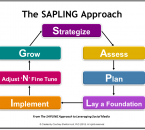[vc_row][vc_column width=”1/1″ css=”.vc_custom_1425938152960{padding-top: 10px !important;}”][vc_row_inner][vc_column_inner width=”1/4″][vc_column_text]

[/vc_column_text][/vc_column_inner][vc_column_inner width=”3/4″][vc_column_text]Most people would agree that hiring social media experts – whether you’re looking for a consultant or to fill an in-house role – is a dicey proposition, especially for buyers who aren’t very digitally sophisticated themselves. This article provides general guidance for organizations looking to hire consultants, contractors, and/or employees to lead and help with social media initiatives, as well as specific guidance for interviewing prospective employees and service providers.[/vc_column_text][/vc_column_inner][/vc_row_inner][divider_line type=”divider_line”][vc_column_text]Earlier this week I published Social Media Experts: Why Organizations Need Them, which counters some of the most frequent criticisms of the notion of social media experts and articulates the need for social media expertise. In that piece I noted that much of the criticism of social media experts is rooted in the fact that many of them lack true depth of knowledge and experience, which is a fair but incomplete assessment of the “social swindler” dilemma. Yes, there are many self-proclaimed experts who are more interested in making a buck by jumping on hot opportunities than developing their craft – and even greater numbers of folks who mean well but are simply naïve, unaware that their knowledge and skills are limited and their experience is narrow and shallow.[/vc_column_text][/vc_column][/vc_row][vc_row][vc_column width=”1/1″][vc_column_text]
Hiring Social Media Experts: The Buyer’s Responsibility
[/vc_column_text][vc_column_text]But this isn’t just a seller’s problem. Buyers – especially social media rookies – play a significant role in the proliferation and prevalence of swindlers and fakes as well, because they:[/vc_column_text][list style=”arrow” color=”grey”]
- Are often too eager to find a quick fix, a silver bullet, a simple, one-size-fits-all solution to the challenges they face.
- Tend to focus on the immediate term rather than viewing the acquisition of digital expertise as a long-term investment.
- Underestimate the importance of finding the right skill set, as well as the appropriate strategic and tactical perspectives.
- Assume that because the platforms and tools are free or low-cost, and relatively easy to use, the expertise required to leverage them effectively should also require a minimal outlay of cash.
- Think (often erroneously) that younger workers are inherently superior at digital engagement, weighting personal experiences with specific platforms and activities more heavily than general work experience and professional expertise.
- Believe that past successes alone are effective predictors of future performance.
[/list][vc_column_text]Organizations looking to buy social technology services and/or hire in-house social media resources need to become more educated consumers and smarter buyers. With that in mind, this article offers general hiring guidance for acquiring social media expertise and specific guidance for interviewing prospective employees and service providers.[/vc_column_text][/vc_column][/vc_row][vc_row][vc_column width=”1/1″][vc_column_text]
Hiring Social Media Experts: Degrees of Expertise
[/vc_column_text][vc_column_text]To reiterate a point I made in the previous article, it’s important to recognize that there is no single definition of expertise and no “one-size-fits-all” model to leveraging that expertise. The most appropriate expert for a given purpose in a particular organization will depend on factors like the organization’s:[/vc_column_text][list style=”arrow” color=”grey”]
- Strategic goals and objectives, both short term and longer term
- Industry and client characteristics
- Level of technological sophistication
- Financial resources
- Employee skill levels and capacity
[/list][vc_column_text]In 2011, Rand Fishkin created a chart that offers a nice starting point for understanding different levels of social media expertise. I would argue that we can distinguish different levels of social media professionals the same way we might professionals in other functional areas: coordinators, analysts, managers, designers, planners, strategists, and advisors. Some organizations will need to acquire or develop individuals with expertise at all these levels, whereas others will only need some of them. For some the best solution will be to bring the expertise in house; for others it will be to use one or more service providers. And of course the right solution will change over time, as technology and an organization’s circumstances and needs continue to evolve.[/vc_column_text][/vc_column][/vc_row][vc_row][vc_column width=”1/1″][vc_column_text]
Hiring Social Media Experts: General Approach
[/vc_column_text][vc_column_text]
Generally speaking, an organization’s approach to hiring social media professionals should be the same as the approach it would use to hire professionals in other disciplines like accounting, finance, law, human resources – and yes, marketing too. That means there needs to be a clear sense of the service/job requirements, well-articulated evaluation criteria, a disciplined interview process, and reference checking.
More specifically, hiring best practices dictate that buyers should engage in the necessary due diligence to ensure:
[/vc_column_text][list style=”arrow” color=”grey”]
- They avoid charlatans who claim to have expertise they don’t really possess.
- The people they hire have the social media know-how they need.
- Social media expertise is complemented by other relevant expertise, including:
- Specific functional areas (e.g., marketing, human resources, knowledge management, project management)
- Skill sets (e.g., writing ability, community management)
- Industries (e.g., healthcare, non-profit, consumer products, manufacturing)
[/list][vc_column_text]
This due diligence is necessary whether an organization is hiring a consultant to provide advice and counsel, an individual or firm to outsource work to, or an employee.
[/vc_column_text][/vc_column][/vc_row][vc_row][vc_column width=”1/1″][vc_column_text]
Hiring Social Media Experts: Interview Questions
[/vc_column_text][vc_column_text]It’s relatively easy to benchmark the requirements for social media and digital technology professionals of all stripes by looking at job board postings and requests for proposals, and by evaluating the digital engagement of key competitors, clients, and other relevant organizations. Once the requirements are identified, it’s relatively easy to do a preliminary screen of applicants to eliminate those who are clearly unqualified or misqualified.
What is likely to be tougher for many organizations is knowing how to further differentiate candidates during the interview process. Here are some questions buyers can ask – and what to look for in their answers:
Q: How would you define or describe social media to a novice?
Can they describe the underlying technologies – not just the most popular platforms – in easy-to-understand terms? Can they provide historical and operational context for today’s digital tools?
Q: What are the main public social media platforms and tools? What are some I may not have heard of?
Can they name platforms besides LinkedIn, Twitter, Facebook, YouTube?
Can they identify platforms and tools that are commonly used and relevant but less obvious as social media technologies than the major platforms? See the Social Media Quotient (SMQ) Quiz I developed for examples.
Q: How would you describe (pick a platform) to me? Does that platform make sense for our organization to use? Why or why not? What platforms should we be using and why?
Do they recognize that not all platforms are appropriate for all organizations?
Can they provide a cogent assessment of what tools are best for your organization and why?
Q: How long have you been using social media and in what capacities? What have you learned from your experiences?
- Have they been intimately involved in creating and/or managing a digital presence, either for themselves or an organization?
- Can they describe their own growth and development, recognize their increasing sophistication, and acknowledge they’re still learning?
Q: How do you respond to people who say that social media is a fad, or that it has no real business value, or that it’s not worth the risks?
Can they provide strong evidence of the permanence of new digital technologies (beyond obvious facts like the number of Facebook users and the anticipated Twitter IPO valuation)?
Are they able to respond to the naysayers’ arguments in terms that would make sense to them and demonstrate why enlightened self-interest can lead them to adopt and embrace new technologies?
Q: What are some of the most important risks to address when it comes to social media use? What approach(es) to risk management do you recommend?
Can they articulate some of the key risks with respect to commercial and employment laws?
Are they aware of the specific considerations in specific industries (e.g., financial services, health care)?
Do they offer pragmatic solutions to manage risks that balance the interests of multiple stakeholders?
Q: Tell me about some social media failures and mistakes (either yours or others). What can we learn from them?
Can they quickly provide examples?
Can they explain what happened and how the mistake reflects the risks and hazards of social media?
Can they identify the best ways to respond to and/or prevent these problems?
Q: What knowledge, skills, and abilities do you think are most critical for a social media professional? What do you consider your greatest strength(s)?
Do they go beyond the obvious competencies like being an enthusiastic user and enjoying cyber-interactions? Do they talk about the importance of thinking before acting, keeping their emotions in check when others get testy, and managing humor?
Do they identify the importance of strong technical skills like writing across multiple media, knowing html, creating/editing content in multiple media types (e.g., images, videos, podcasts), and analytics?
Do they recognize that digital engagement can be a tedious grind – hours of boredom punctuated by moments of crisis – and not consistently fun and exciting?
Q: How would you measure social media success in our organization?
Are they able to put common metrics (e.g., number of followers/fans, Klout scores) in proper perspective?
Can they describe the differences between short- and long-term measures of success?
Do they talk about alternative measures for evaluating success (e.g., relative improvements over time)?
Q: What are your go-to resources for social media? What books, bloggers, and/or websites do you like best?
Do they recognize they’re still learning and that staying current via reading (not just doing) is critical?
Can they quickly rattle off resources in each category?[/vc_column_text][/vc_column][/vc_row][vc_row][vc_column width=”1/1″][vc_column_text]
Hiring Social Media Experts: Putting it All Together
[/vc_column_text][vc_column_text]
The specific questions buyers should use will depend on the type and level of expertise they’re looking for. Buyers don’t necessarily need to know the answers to these questions themselves to judge the responses effectively. What they should look for is how the candidate responds, the same way they would for other technical jobs they may not completely understand. In addition to the specific tips above, here are a few general things to look for:
[/vc_column_text][list style=”arrow” color=”grey”]
- Tempered rather than unabashed enthusiasm for new technologies
- Recognition of how different technologies can be used to meet goals and objectives and the importance of integrating them with other initiatives
- Respect rather than disdain for social media rookies
- Understanding of the challenges to social media success (e.g., resistance to change, political issues, resource constraints)
- Lessons learned from experience (theirs or others), as well as recognition of the need and a commitment to continuous learning.
[/list][vc_column_text]
As always, I invite people to raise questions and offer additional insights and resources. More guidance on assessing and hiring social media experts would be particularly useful for social media rookies. Thanks!
[/vc_column_text][divider_line type=”divider_line”][/vc_column][/vc_row]






Comments
7 responses to “Hiring Social Media Experts: Guidance for (Rookie) Buyers”
Mary Long recently shared some great advice along similar lines via Social Media Today. Here’s a link to her piece:
http://socialmediatoday.com/maryclong/1674301/when-its-time-hire-digital-strategist-beware-social-charlatans